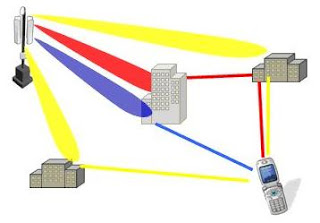| Super WiFi = Smart Antenna WiFi + Cellular Architecture Technology Positioning of WiFi Among the various wireless technologies, WiFi is originally positioned as a wireless LAN application for indoor coverage. We use patented smart antenna technology to increase the standard coverage of WiFi signal, so as to making WiFi can be deployed in outdoor environment. The A8 WiFi base station can provide super coverage:
The WiFi Challenge Weak Uplink Performance Unlike 2G/3G cellular devices, the WiFi clients have low transmit power and without any power control mechanism. The WiFi uplink performance is very limited. Uplink Requirement On The Rise Nowadays, many consumer devices (PDAs, dual-mode phones, multimedia players) are equipped with WiFi and user applications (emails, interactive gaming/messaging, image/video upload) emphasize increasing uplink requirement. Altai Solution By making use of the smart antenna design and advanced signal processing algorithm, the A8 WiFi base station can effectively provide extended WiFi signal coverage and improved uplink performance, whilst minimizing the interference effect of other signals in the un-licensed frequency spectrum, and yet lower the required capital investment in wireless network infrastructure. Features Key Benefits Benefits to Service Providers By deploying the outdoor WiFi base station with super coverage, service providers can be able to:
|
Technology Positioning of WiFi
Among the various wireless technologies, WiFi is originally positioned as a wireless LAN application for indoor coverage.
We use patented smart antenna technology to increase the standard coverage of WiFi signal, so as to making WiFi can be deployed in outdoor environment.
The A8 WiFi base station can provide super coverage:
- 300-500m radius in non-line-of -sight environment (NLOS)
- Upto 1km radius in line-of-sight environment (LOS); whereas typical WiFi coverage is around 100-150m NLOS
The WiFi Challenge
Weak Uplink Performance
Unlike 2G/3G cellular devices, the WiFi clients have low transmit power and without any power control mechanism. The WiFi uplink performance is very limited.
Uplink Requirement On The Rise
Nowadays, many consumer devices (PDAs, dual-mode phones, multimedia players) are equipped with WiFi and user applications (emails, interactive gaming/messaging, image/video upload) emphasize increasing uplink requirement.
Altai Solution
By making use of the smart antenna design and advanced signal processing algorithm, the A8 WiFi base station can effectively provide extended WiFi signal coverage and improved uplink performance, whilst minimizing the interference effect of other signals in the un-licensed frequency spectrum, and yet lower the required capital investment in wireless network infrastructure.
Features
Key Benefits
Benefits to Service Providers
By deploying the outdoor WiFi base station with super coverage, service providers can be able to:

- Advanced digital signal processing algorithm
- Multi-path beam switching to select best receiving signal
- Adaptive interference control
- Coverage/capacity improvement
- Cover the un-served area with wireless broadband in a short time (less base stations to be built & commissioned)
- Lower the total cost in deploying & operating the network (less installation sites & equipment to be acquired & setup)
| System Features | Distinct Advantages | Key Benefits |
| Smart Antenna Technology |
|
|
| Multi-radio Hardware Architecture |
|



